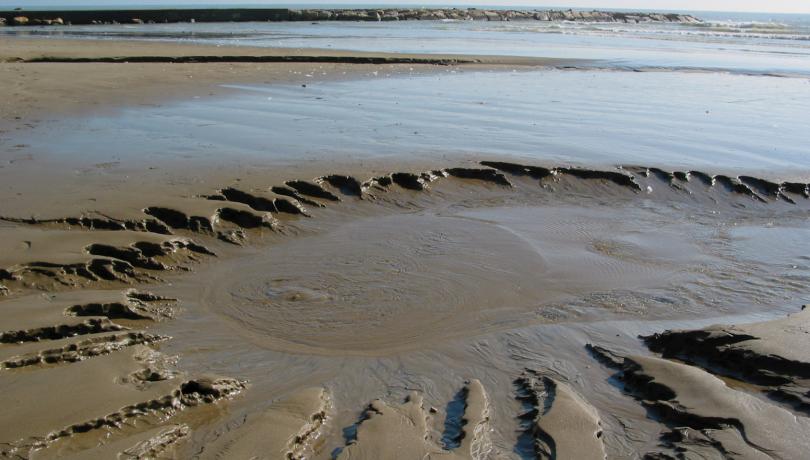The work, in which the ICM-CSIC participated, was recently been published in the journal Nature Reviews Earth and Environment.

A pioneering review study published recently in the journal Nature Reviews Earth and Environment has warned about the profound climate change effects on coastal groundwater water quality. The work compiles and discusses the current knowledge of the impact of climate change on coastal groundwaters, a critical water resource for many human populations and a key component of coastal ecosystems.
The study, led by Christina Richardson from the University of California in Santa Cruz (California, USA) in collaboration with researchers from other institutions in USA, Germany, Australia and the Institut de Ciències del Mar (ICM-CSIC), delves into the intricate web of climate impact and anthropogenic drivers affecting coastal groundwater. Also, it assesses the current state, identifies gaps in knowledge, and outlines future directions for understanding and managing this critical resource.
Coastal groundwater, a lifeline for humanity
With nearly 40% of the world's population residing within 100 km of coastlines, coastal groundwater plays a pivotal role in providing drinking water and supporting agriculture. Also, it serves as a significant source of water, nutrients, and dissolved constituents to nearshore environments, rivalling global riverine inputs.
The location of coastal groundwater at the terrestrial-marine interface and in population-dense regions makes it highly susceptible to anthropogenic and climatic changes. However, the work, that reviews 140 globally-distributed studies assessing how climate change impacts coastal groundwaters, points out that while climatic aspects such as sea level rise, coastal flooding, and precipitation changes have received substantial attention, there is a need for more comprehensive exploration of other factors such as changes in wind speed, ocean chemistry, coastal erosion, and ice and snow melt.
In this regard, Christina Richardson emphasizes:
"Understanding these diverse aspects is crucial, as sea level rise alone can lead to seawater intrusion and salinization, rendering coastal groundwater unsuitable for consumption or irrigation."
Moreover, according to the analysis most studies are local, and climate change consequences can be highly variable across locations, hindering the generalization of potential climate change effects across regions. Thus, adds Christina, “it is likely that some coastal temperate and tropical ecosystems might be more impacted by seawater intrusion owing to sea-level rise and coastal flooding, whereas others, such as coastal polar ecosystems, could be more affected by increases in ice or snow melt”.
Additionally, the study urges the inclusion of often-overlooked realms of chemistry and biology, given that most studies so far have focused on climate change driven changes in hydrology and salinity. In this sense, Clara Ruiz-Gonzalez from the ICM-CSIC, highlights the need to better understand the microbial communities in coastal aquifers and their responses to changing physicochemical environments:
“This holistic approach is essential for predicting how climate change will impact nutrient and contaminant fluxes to the ocean”.
Human-induced stressors, including groundwater extraction and fertilizer use, interact with climate change, exacerbating its effects. This can endanger the sustainability and vulnerability of marine systems, as well as the services and goods that they provide, such as leisure activities or water and food provisioning.
Kay Davis from the Leibniz Centre of Tropical Marine Research warns, "3% of recharge-limited coastal groundwater systems are at risk of turning fully arid by 2080, affecting freshwater sources relied upon by approximately 375 million people". Given this scenario, the study underscores the urgency of addressing both climate and anthropogenic stressors simultaneously.
Finally, the study concludes with a call to urgently gain comprehensive knowledge of hydrogeological, geochemical, and biological processes at the land-ocean interface. This will imply establishing global long-term monitoring sites in diverse hydrogeological settings, climate zones and ecosystem types to better understand baseline coastal groundwater conditions, track changes, and support resource management.
Finally, the study concludes with a call to urgently gain comprehensive knowledge of hydrogeological, geochemical, and biological processes at the land-ocean interface. This will imply establishing global long-term monitoring sites in diverse hydrogeological settings, climate zones and ecosystem types to better understand baseline coastal groundwater conditions, track changes, and support resource management.